Daily Vocabulary Words: List of Daily Used Words
Hi there. Welcome to this special section @ Wordpandit.
Our endeavour here is straightforward: highlighting important daily vocabulary words, you would encounter in The Hindu. This is your repository of commonly used words; essentially, we are posting a list of daily used words. Hence, this has significant practical application as it teaches you words that are commonly used in a leading publication such as The Hindu.
Visit the website daily to learn words from The Hindu.
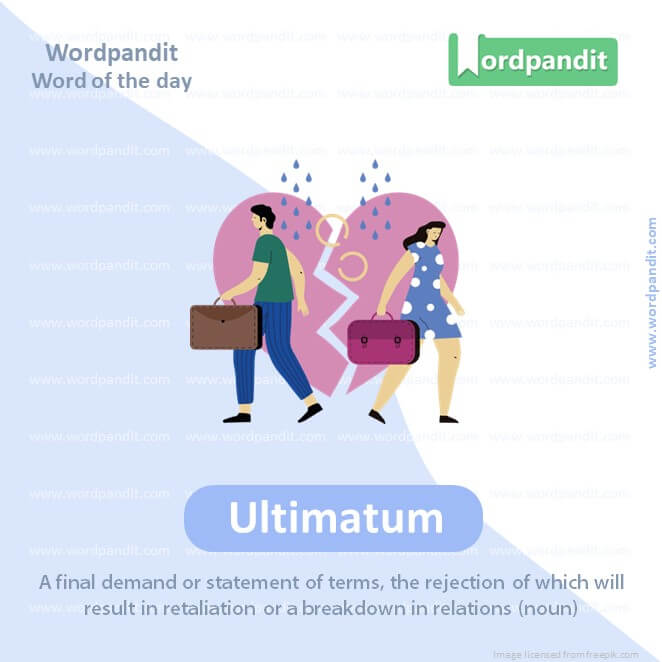
WORD-1: Ultimatum
CONTEXT: The Maratha mobilisation for reservation in higher education and public employment has reached its peak with the protesters issuing an ultimatum to the government.
SOURCE: The Hindu
EXPLANATORY PARAGRAPH: Imagine if your mom says, “Clean your room by tonight, or no video games for a week!” That’s like an ultimatum. It’s when someone tells you that you must do something or something else, often not so nice, will happen.
MEANING: A final demand or statement of terms, the rejection of which will result in retaliation or a breakdown in relations (noun).
PRONUNCIATION: ull-tih-MAY-tum
SYNONYMS: Demand, Final offer, Final terms, Last word, Final warning
USAGE EXAMPLES:
1. The boss gave an ultimatum to complete the project by Friday.
2. The teacher’s ultimatum was clear: submit the assignment or fail the class.
3. The government issued an ultimatum to the protestors.
4. He gave her an ultimatum: attend counseling or the marriage is over.
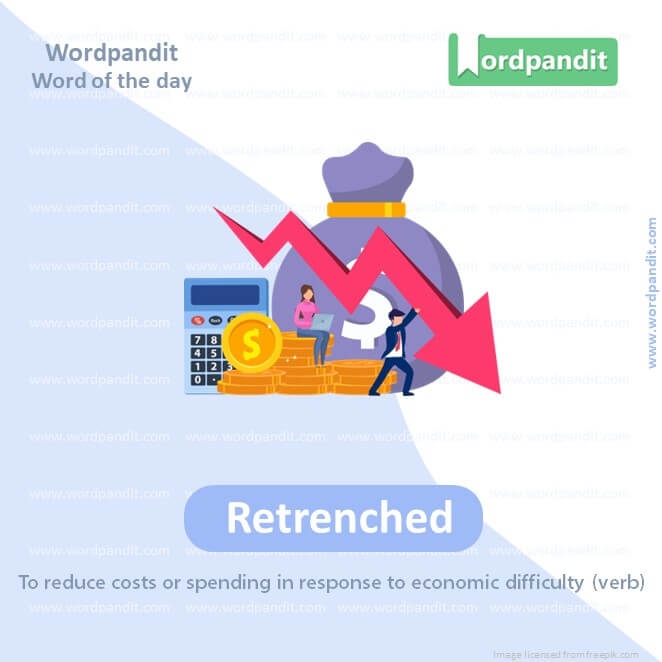
WORD-2: Retrenched
CONTEXT: these companies have either closed or have significantly retrenched their workforce.
SOURCE: The Hindu
EXPLANATORY PARAGRAPH: Retrenched is like when you have too many toys and your mom says you need to keep only your favorites. It means to reduce or make smaller, like keeping fewer toys.
MEANING: To reduce costs or spending in response to economic difficulty (verb).
PRONUNCIATION: ree-TRENCHT
SYNONYMS: Reduce, Cut back, Downsize, Decrease, Slash
USAGE EXAMPLES:
1. The company retrenched its workforce to save money.
2. After the recession, many families retrenched their budgets.
3. To survive the crisis, the business had to retrench.
4. Government policies led to retrenched public spending.
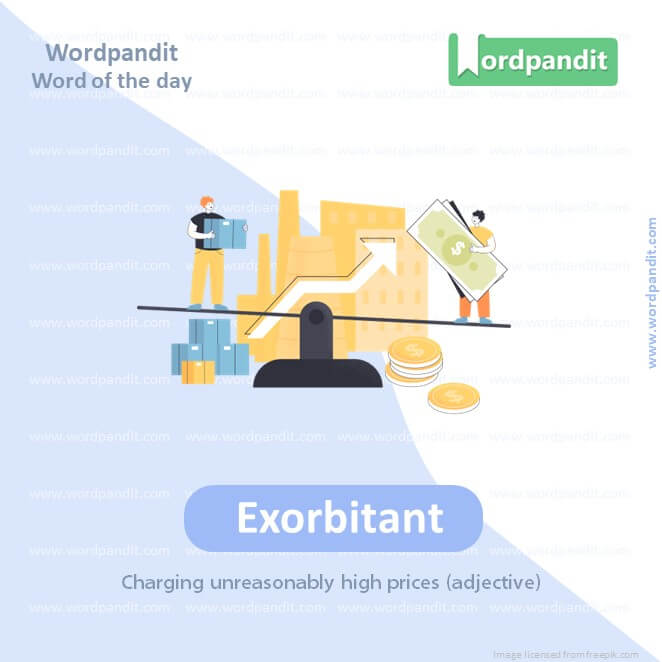
WORD-3: Exorbitant
CONTEXT: private institutions charge exorbitant fees and have illegal capitation fees that range from ₹1-10 million for engineering courses, ₹20-40 million for MBBS courses, ₹5-12 million for dental courses, and about ₹30,000-50,000 for courses in arts and science colleges.
SOURCE: The Hindu
EXPLANATORY PARAGRAPH: Exorbitant is like when a toy costs a lot more money than it should. It’s used to describe something that is way too expensive.
MEANING: Charging unreasonably high prices (adjective).
PRONUNCIATION: ex-OR-bi-tant
SYNONYMS: Expensive, Overpriced, Costly, Steep, Excessive
USAGE EXAMPLES:
1. The shop was selling the toys at exorbitant prices.
2. Renting a small apartment in the city is exorbitant.
3. The exorbitant cost of healthcare worries many people.
4. She refused to pay the exorbitant fee for late registration.
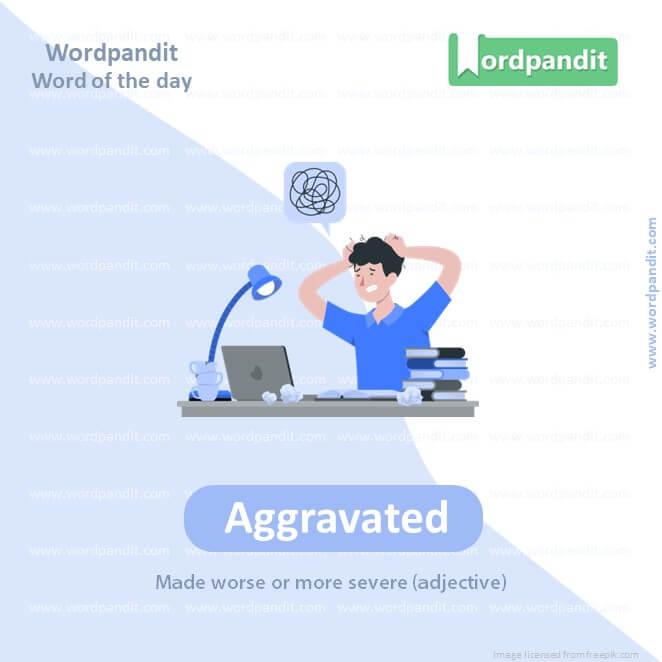
WORD-4: Aggravated
CONTEXT: It is further aggravated by the disturbance of caste hierarchy norms due to the educational and economic mobility of a tiny section of Dalits, together with their social, cultural and political assertion.
SOURCE: The Hindu
EXPLANATORY PARAGRAPH: Aggravated is when something bad becomes even worse, like if you have a small cut and then you fall and it gets bigger.
MEANING: Made worse or more severe (adjective).
PRONUNCIATION: AG-ruh-vay-tid
SYNONYMS: Worsened, Intensified, Escalated, Heightened, Exacerbated
USAGE EXAMPLES:
1. His rude comment aggravated the argument.
2. The traffic jam was aggravated by the road construction.
3. Her condition aggravated overnight.
4. The delay only aggravated our frustration.
WORD-5: Resilient
CONTEXT: Darwin’s notion of resilient adaptability has withstood the test of time.
SOURCE: The Hindu
EXPLANATORY PARAGRAPH: Resilient is like a rubber ball that bounces back when you throw it on the ground. It means being able to become strong, happy, or successful again after a difficult situation or event.
MEANING: Able to withstand or recover quickly from difficult conditions (adjective).
PRONUNCIATION: ree-ZIL-yent
SYNONYMS: Tough, Strong, Bouncy, Flexible, Quick to recover
USAGE EXAMPLES:
1. Children are often remarkably resilient.
2. The resilient material returned to its original shape.
3. After the earthquake, the community showed great resilience.
4. Her resilient spirit helped her overcome the illness.
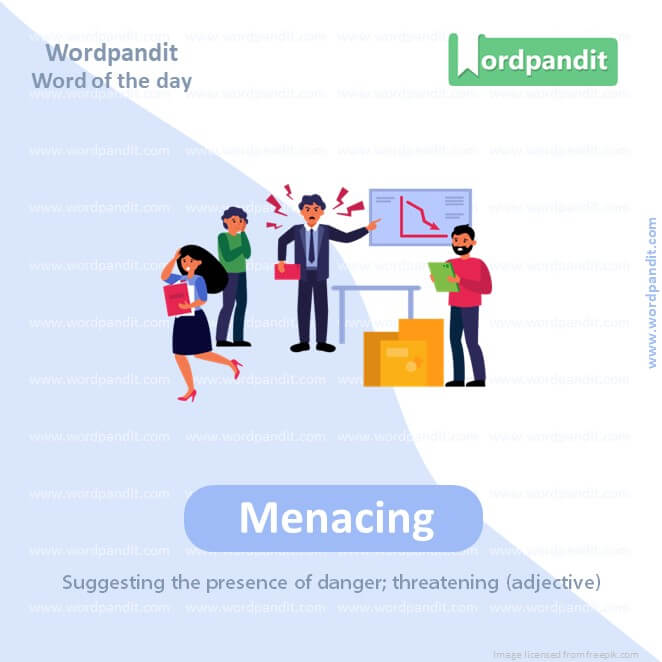
WORD-6: Menacing
CONTEXT: hard security challenges in the maritime domain have acquired a new, menacing dimension.
SOURCE: The Hindu
EXPLANATORY PARAGRAPH: Menacing is like a dark cloud that looks like it could bring a big storm. It means something looks dangerous or threatening.
MEANING: Suggesting the presence of danger; threatening (adjective).
PRONUNCIATION: MEN-uh-sing
SYNONYMS: Threatening, Intimidating, Frightening, Scary, Foreboding
USAGE EXAMPLES:
1. The dog’s menacing growl scared the mailman.
2. Dark clouds had a menacing appearance.
3. His menacing tone made us uneasy.
4. The storm looked menacing on the horizon.
WORD-7: Reluctant
CONTEXT: Notwithstanding their espoused positions on the need for a cooperative security architecture, many littoral states are reluctant to pursue concrete solutions to the challenges at sea.
SOURCE: The Hindu
EXPLANATORY PARAGRAPH: Reluctant is when you don’t really want to do something, like when you’re asked to clean your room but you’d rather play.
MEANING: Unwilling and hesitant; disinclined (adjective).
PRONUNCIATION: ree-LUK-tunt
SYNONYMS: Unwilling, Hesitant, Disinclined, Resistant, Unenthusiastic
USAGE EXAMPLES:
1. She was reluctant to answer the difficult question.
2. He gave a reluctant apology.
3. They were reluctant to invest in the new project.
4. The reluctant participant finally joined the game.
WORD-8: Predominant
CONTEXT: This disparity, besides the predominant rural nature of livelihoods among the poorer Marathas amid the prolonged nature of the recurring agrarian crisis in the State.
SOURCE: The Hindu
EXPLANATORY PARAGRAPH: Predominant is like the most popular color in a big box of crayons. It means being the most common or the strongest in a group or situation.
MEANING: Present as the strongest or main element (adjective).
PRONUNCIATION: pre-DOM-ih-nunt
SYNONYMS: Main, Dominant, Chief, Leading, Principal
USAGE EXAMPLES:
1. Blue is the predominant color in the painting.
2. She played a predominant role in the team’s success.
3. The predominant opinion was in favor of the change.
4. English is the predominant language in the country.
WORD-9: Entrapped
CONTEXT: The entrapped workers and their families are undergoing extreme psychological stress.
SOURCE: The Hindu
EXPLANATORY PARAGRAPH: Entrapped is like when you build a fort and your little brother gets stuck inside. It means to be caught or trapped in a place or situation that’s hard to get out of.
MEANING: Caught or trapped, especially by trickery or deception (verb).
PRONUNCIATION: en-TRAPT
SYNONYMS: Trapped, Snared, Caught, Ensnared, Captured
USAGE EXAMPLES:
1. The animal was entrapped in the net.
2. He felt entrapped in a job he didn’t like.
3. The spy entrapped his enemy with clever tactics.
4. The law protects consumers from being entrapped by false advertising.
WORD-10 Premised
CONTEXT: Economic growth premised on fossil fuel consumption, while cheaper per unit than renewable energy, spells disaster.
SOURCE: The Hindu
EXPLANATORY PARAGRAPH: Premised is like when you start telling a story by saying, “Imagine a world where dinosaurs still live…” It’s the beginning or the base idea of your story or argument.
MEANING: Based upon or following from an earlier statement or argument (verb).
PRONUNCIATION: PREM-ist
SYNONYMS: Based, Grounded, Founded, Rooted, Hinged
USAGE EXAMPLES:
1. The theory is premised on solid research.
2. His argument was premised on outdated information.
3. The plan was premised on the assumption of a quick victory.
4. The novel is premised on a fascinating concept.
Vocabulary PDF
In the digital age, the way we learn languages has transformed dramatically. Among the myriad of resources at our disposal, a ‘vocabulary PDF’ serves as an incredibly effective tool. It offers a structured, accessible and convenient method of enhancing our language skills. To maximize the potential of ‘vocabulary PDF’, it is crucial to understand how to make the most of it.
First off, when venturing through the process of learning with a ‘vocabulary PDF’, maintaining consistent learner engagement is pivotal. This involves regular revision sessions where you consistently go back and refresh your memory about previously learned words. This cyclic process is particularly effective in promoting long-term retention of the vocabulary.
While leveraging a ‘vocabulary PDF’, it’s also beneficial to annotate as you progress. Annotation brings an interactive aspect to your learning, making it dynamic and personalized. Make notes of context, synonyms, antonyms, or even create sentences using the new words. This engagement with the ‘vocabulary PDF’ aids in imbibing the meaning and usage of the words.
Another strategic approach to mastering a ‘vocabulary PDF’ is to utilize a reading aloud technique. Listening to the words as you speak them out loud can stimulate auditory learning, enhancing your pronunciation and comprehension of the vocabulary.
When using a ‘vocabulary PDF’, it is also advantageous to supplement your learning through applications of the new words. Write an essay, engage in a conversation, or post on social media using the new words. This reinforces the acquired vocabulary, augmenting your grasp over them.
In conclusion, a ‘vocabulary PDF’ is a potent instrument that, when harnessed effectively, can significantly bolster your language learning journey. It requires a blend of consistent revision, active annotation, auditory engagement, and practical application. With these strategies in hand, mastering ‘vocabulary PDF’ can be a rewarding and successful experience that fuels your linguistic endeavors.










